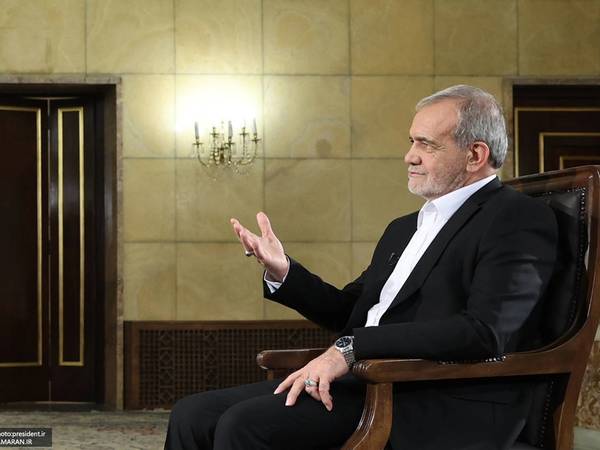Iranian President Masoud Pezeshkian has stated that his government cannot implement a new hijab law passed by the hardline parliament, warning that its enforcement would lead to widespread discontent in Iranian society.
“There are too many questions about the execution [of the hijab law] for me who must implement it… Will society accept this? … We must not do something that will cause discontent among others [for offering services to unveiled women],” Pezeshkian said in his second televised interview with state television since taking office.
According to political analysts, Pezeshkian is facing immense pressure from his supporters to resist pressure from ultra-hardline factions urging him to sign the finalized law.
“An unjust law will not be enforced, and if it is, it will create discontent,” Pezeshkian said in the interview, later adding that he was consulting with other authorities to seek a resolution to the current impasse.
He also suggested that ultra-hardliners had tried to cause a challenge to his newly formed government by demanding the enforcement of the hijab law as soon as he took office.
In response to the interview, conservative politician and journalist Mohammad Mohajeri posted on X, saying “Pezeshkian announced in the televised interview, correctly, that the hijab law is not implementable and will bear no outcome other than discontent in the society.”
“This law will not only not encourage anyone to wear the hijab but will also create new challenges with an unpredictable outcome in the difficult current circumstances. The solution is to be reasonable,” Mohajeri added.
During his presidential campaign, Pezeshkian pledged to end hijab patrols and violence against women for dress code violations. Now, his supporters and some reformist-aligned media are openly calling on him to honor that commitment.
Sazandegi newspaper printed an image of Pezeshkian’s tweet during the campaign on its front page on Monday with the headline “A Promise Should Be Fulfilled” across the top in prominently large letters.
At the time, several high-profile politicians backed Pezeshkian’s promise by declaring that they guaranteed that Pezeshkian would not keep his promises – including current Vice President for strategic affairs Javad Zarif.
Mandatory hijab regulations were first introduced in 1981, following the 1979 Islamic Revolution, and formally enforced in 1983.
The details of the new hijab law, unveiled by domestic media on Saturday, including stricter measures and the potential rise of vigilantism, have deeply unsettled many Iranians.
In response to a solicitation for audience opinions, many citizens told Iran International this week that they fear the new law will be used as a tool for state-driven financial exploitation.
They expressed concerns that, rather than relying on the morality police, the government might enforce hijab rules through cash fines, prison sentences, and measures like denying women access to social rights and services.
The ultra-hardliner Kayhan newspaper, unexpectedly, on Monday criticized the new hijab law from a different perspective and accused reformists of using the controversies over it to “oppose the hijab as a principle”.
Kayhan contended that there was no need for a new hijab law and argued that insistence on new methods of enforcement instead of the so-called morality police patrols has resulted in a “several-fold increase in the foul and destructive spectacle of unveiling.”
In the recent interview, Pezeshkian also insisted that the enforcement of the hijab law will affect not only the women who have chosen to be unveiled but also others because it threatens to penalize restaurants and drivers of ride-hailing services for not refusing service or reporting them to authorities.
"They want to penalize Snapp drivers for unveiling their passengers. This causes discontent. What does [the unveiling of the passenger] have to do with him?" he asked.
Impasse over hijab law amid government infighting
The ultra-hardline-dominated Guardian Council gave its final approval to the hijab law in mid-September.
Typically, the president officially communicates such legislation to all government agencies within a few days for implementation.
The law has been in limbo, however, since then due to Pezeshkian's refusal to take the required step. Pezeshkian is not the first president to refuse to take responsibility for legislation they opposed. In a few instances in the past, former Presidents Mahmoud Ahmadinejad and Hassan Rouhani took the path of shifting the responsibility to the speaker.
If Pezeshkian continues to refuse to communicate the law, the onus to give the hijab law official status will be on Parliament Speaker Mohammad-Bagher Ghalibaf.
Pezeshkian and Ghalibaf's fraught relationship has recently worsened, over another government bill aimed at preventing Vice President Zarif's exclusion from the government over his son's American citizenship.
Last week, Ghalibaf signaled a shift by aligning with ultra-hardline factions, declaring Zarif's appointment illegal and asserting the hijab law would become official by 13 December, though he did not clarify who would authorize its communication.
Since Pezeshkian’s appointment, the enforcement of the state’s existing hijab regulations has continued and intensified. Several high-profile cases underscore the authorities' ongoing focus on forcibly regulating women’s public behavior.
The ongoing standoff arises amid continued societal backlash against the enforcement of the hijab, compounded by years of dissent and protests.
